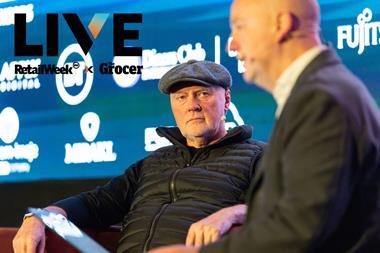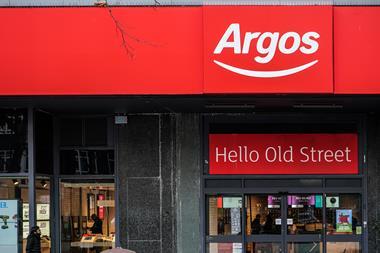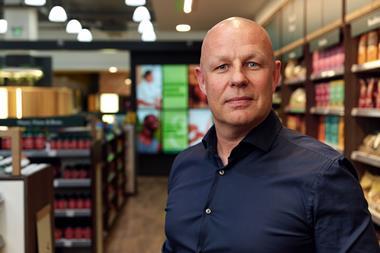It takes a lot to ruffle Lady Sylvia Jay's feathers. The Food from Britain chair's demeanour is usually as polished and composed as her title suggests. But she still finds it difficult to disguise her shock and disappointment over Defra's decision to pull its funding. In a candid interview with The Grocer, days after the subsequent decision to wind up FFB's UK operation, she recalls the day in February she received the news from FFB chief executive John Adams. "John rang me and said it wasn't good news," she says. "We were shocked because we'd worked so hard. We saw cuts coming but not to that extent. Defra had been working with us as to the best way to manage the cuts. As of May last year we were told to expect 25% to 50%. It was settled pretty formally that it would be 25% and we'd been working with them very closely on that basis." Meanwhile, and in a move that Lady Jay insists was unconnected with the impending cuts, FFB had stripped out a whole layer of management in a bid to streamline the organisation and make it more commercially viable. After the inevitable dip in morale, the mood was improving and staff were "pretty enthusiastic about meeting the challenges", she says. "Then we got the phone call telling us that a decision had been made that instead of £4.6m, we would only get £4m this year. Defra also said it had taken a decision not just for us but for all non-departmental public bodies that they were going to stop investing in us completely by 2011. That was a shock." It was also the final nail in the coffin. A fortnight later on 3 March, the two met Lord Rooker and the following day the rest of the FFB council as well as representatives from Defra, the devolved nations and UK Trade & Investment, and came to a decision. As of the end of March 2009, FFB, in its present guise, would cease to exist. For an organisation supposed to be celebrating its 25th anniversary this year, it was the worst-possible outcome - and all the more galling in the wake of government assurances last year that Defra would continue to support it. "In December the government said it saw 'a continuing and important future for FFB as a public sector body'," says Lady Jay wryly. Ironically, the announcement of its dissolution came just as new export figures showed food and drink exports were poised to break the £11bn barrier this year - a new record. Though the nine international offices, which were privatised in 1991, have vowed to continue despite the loss of almost £2.4m in funding, FFB's disbandment in the UK will be a major body blow to would-be exporters, believes former editor of The Grocer, Clive Beddall, who describes Defra's decision as "one of the most unfortunate in the history of UK Grocery plc". Andrew Stokes, export sales manager at Walkers Shortbread, last year's FFB exporter of the year, is equally scathing. "My view is it's short-sighted of the government," he says. "FFB is regarded as a one-stop shop by would-be exporters, particularly the smaller companies. When you're starting out there are an awful lot of pitfalls and traps. FFB makes it a lot easier." The impact will not be felt for two or three years, believes Lady Jay, but she agrees it will be the small and medium-sized businesses that will be hardest hit. "I don't foresee problems so much for companies such as Tyrrells. It's the next generation of Tyrrells that are in danger." Despite this, she is surprisingly sanguine about Defra's u-turn. "This isn't Defra being deliberately nasty. This is Defra being confronted with the reality that, like other government departments, it has to absorb budget cuts," she says, adding that in some ways, the writing was already on the wall. "For some time, I and others at FFB have been remonstrating with Defra and UKTI that some of the work we were doing and we were being told to do was being replicated elsewhere, especially through UKTI, the English regions, the devolved nations and the levy boards, and that there was a lack of cohesion," she says. The organisation had struggled to become more commercial, she admits, though not for want of trying. When David McNair, the former chief executive, took early retirement, it actively sought a replacement with serious commercial clout, but to no avail. Adams was brought in on a temporary basis to plug the gap and Lady Jay has nothing but praise for him. "I'd have been lost without him," she says. "I'd been trying to run it on my own!" Clearly, the two days a week she is supposed to work have become somewhat notional for Lady Jay, who also has to find time to fulfil her responsibilities as vice chairman of L'Oréal, chairman of the Pilgrim Trust and non-executive director of Saint-Gobain. However committed to the cause she and the team have been, Lady Jay believes FFB was always going to struggle to evolve. "FFB was not set up as a commercial entity but as a public one, an NDPB. That has been its business model since 1983," she says. "Other than the international offices, nothing we did was completely commercially viable. There were some parts, for instance exhibitions and events, that came jolly close to breaking even, but the remit of the organisation is not revenue-earning. "If we were going to try and make this a commercial enterprise, we would have to have a completely different model. We haven't the time or the capacity for that. The whole raison d'être of the business is not commercial." Others beg to differ. Tony Matthews, who was FFB North America president from 1984 to 1998, feels FFB threw in the towel too quickly. "The business model, which has not changed since 1991, has been a conspicuous success and recognised as such by the trade in the UK and as importantly by the distributors and retailers overseas," he says. "Lady Jay should have taken time to contact the numerous individuals in the business and selected MPs and members of the Lords who have always been supportive of FFB before announcing its demise." Rumours thereof may yet proof greatly exaggerated. Lady Jay remains hopeful that some or all of FFB's functions will be picked up by the devolved nations, UKTI or the regions, but she's also talking to the Food and Drink Federation, the organisation she was once director general of. It's very early days but, she admits, the idea had crossed her mind when she was at the FDF. "It was always something I personally had in mind but hadn't got around to. I'm hoping FDF will give some thought to it. It will depend as to whether it can draw something up that will be self-financing and useful to its members." Whatever the outcome, she is confident there will be strong demand for FFB personnel and is fulsome in her praise of the organisation's 20 full-time staff and four consultants in the UK. "Any member of staff could walk into a fabulous job tomorrow if they chose. Staff in some sections have a depth of experience that is not easily found anywhere else," she says, singling out the events and exhibition team in particular. How successful the international offices will be without a central office remains to be seen. Remarkably, no-one has yet handed in their resignation and, Lady Jay insists, for the time being it's very much business as usual. But the countdown has begun. "FFB will stop operating on current plans next March," she says starkly. "Gradually, towards the end of this year, we will start to put people in what I hope will be other and better directions." Would-be exporters will be keeping their fingers crossed that a phoenix does indeed rise from FFB's ashes.n
Age: 61 Education: Read social sciences at Nottingham University and attended London School of Economics Career: Spent 20 years in the Civil Service before moving to Paris as the wife of the British Ambassador. Became director general of the Food and Drink Federation in 2001, a post she held until 2005. Awarded a CBE in 2004 for services to the food industry. In 2006, was appointed FFB chair That's nice purple nail varnish you're wearing. What is it? Thank you. I'm not sure. It's probably something by L'Oréal, possibly Lancôme What do you get up to in your free time? I cook, I garden. I try to cook seasonally. Sprouting broccoli is good at the moment. You can serve it as you would asparagus, with a hollandaise or cheese sauce. I'm also using up the last of my game, which I've been deep freezing at the house in Oxfordshire. One of my neighbours gives it to me You obviously have a real passion for food. I'm very interested in British food. I've always thought that the way a nation approaches its food is integral to its culture and health. When I was in Paris, I served guests Neal's Yard or English cheeses - though our oldest English cheese is in fact Wensleydale, which was made by Cistercian monks from France!
Age: 61 Education: Read social sciences at Nottingham University and attended London School of Economics Career: Spent 20 years in the Civil Service before moving to Paris as the wife of the British Ambassador. Became director general of the Food and Drink Federation in 2001, a post she held until 2005. Awarded a CBE in 2004 for services to the food industry. In 2006, was appointed FFB chair That's nice purple nail varnish you're wearing. What is it? Thank you. I'm not sure. It's probably something by L'Oréal, possibly Lancôme What do you get up to in your free time? I cook, I garden. I try to cook seasonally. Sprouting broccoli is good at the moment. You can serve it as you would asparagus, with a hollandaise or cheese sauce. I'm also using up the last of my game, which I've been deep freezing at the house in Oxfordshire. One of my neighbours gives it to me You obviously have a real passion for food. I'm very interested in British food. I've always thought that the way a nation approaches its food is integral to its culture and health. When I was in Paris, I served guests Neal's Yard or English cheeses - though our oldest English cheese is in fact Wensleydale, which was made by Cistercian monks from France!















No comments yet